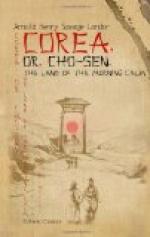Leprosy also prevails in Cho-sen, and in the more serious cases seems to affect the brain, producing idiocy. This disease is caused by poverty of blood, and is, of course, hereditary. I have seen two forms of it in Cho-sen; in the one case, the skin turns perfectly white, almost shining like satin, while in the other—a worse kind, I believe—the skin is a mass of brown sores, and the flesh is almost entirely rotted away from the bones. The Coreans have no hospitals or asylums in which evils like these can be properly tended. Those affected with insanity are generally looked after by their own families, and, if considered dangerous, are usually chained up in rooms, either by a riveted iron bracelet, fastened to a short heavy chain, or, more frequently, by an anklet over the right foot.
Families in Corea are generally small in number. I have no exact statistics at hand, for none were obtainable; but, so far as I could judge from observation, the males and females in the population are about equal in number. If anything, the women slightly preponderate. The average family seldom includes more than two children. The death-rate of Cho-sen infants is great, and many reasons can account for the fact. In the first place, all children in Corea, even the stronger ones who survive, are extremely delicate until a certain age is attained, when they seem to pick up and become stronger. This weakness is hereditary, especially among the upper classes, of whom very few powerful men are to be found, owing to their dissolute and effeminate life.
Absolute sterility in women is not an uncommon phenomenon, and want of virile power in the male part of the community is also often the subject of complaint; many quaint drugs and methods being adopted to make up for the want of it, and to stimulate the sexual desire. A good many of the remedies resorted to by the Corean noblemen under such circumstances are of Chinese manufacture and importation. Certain parts of the tiger, dried and reduced to powder, are credited with the possession of wonderful strengthening qualities, and fetch large sums. Some parts of the donkey, also, when the animal is killed during the spring and under special circumstances, are equally appreciated. The lower classes of Cho-sen—as is the case in most countries—are more prolific than the upper ones. The parents are both healthier and more robust, and the children in consequence are stronger and more numerous, but even among these classes large families are seldom or never found. Taken as a whole, the population of Corea is, I believe, a slowly decreasing quantity.




